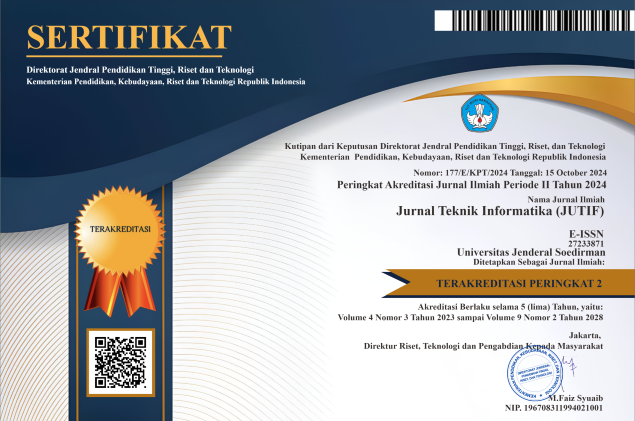NAÏVE BAYES ALGORITHM CLASSIFICATION IN SENTIMENT ANALYSIS COVID-19 WIKIPEDIA
DOI:
https://doi.org/10.20884/1.jutif.2022.3.4.311Keywords:
Classification, COVID-19, Naïve Bayes Classifier, Sentimen Analysis, Text Mining, WikipediaAbstract
In recent years during the pandemic Wikipedia created more than 5,200 new pages regarding COVID-19 cases, with an accumulation of more than 400 million pages by mid-June 2020. Wikipedia is one of the most popular websites of our time. In this case Wikipedia always integrates new and fast research. To get an opinion from wikipedia text, sentiment analysis is needed. The analysis was conducted using a classification containing public sentiment regarding the issue of COVID-19 in Indonesia. The classification method used in this study is naive bayes classifier (NBC). Naïve Bayes Classifier is a popular method of solving classification problems. This classification method is often used in sentiment analysis in both precision and data computing. This wikipedia classification is obtained from each label, namely positive, negative and neutral classes. The results of tests conducted in the classification of naive bayes get a high accuracy of 81%.
Downloads
References
G. Colavizza, “COVID-19 research in Wikipedia,” Quant. Sci. Stud., vol. 1, no. 4, pp. 1349–1380, 2020, doi: 10.1162/qss_a_00080.
Prabowo, W. A. and Wiguna, C. 2021. ‘Sistem Informasi UMKM Bengkel Berbasis Web Menggunakan Metode SCRUM’, Jurnal Media Informatika Budidarma, 5(1), p. 149. doi: 10.30865/mib.v5i1.2604.
P. Konieczny, “From Adversaries to Allies? The Uneasy Relationship between Experts and the Wikipedia Community,” She Ji, vol. 7, no. 2, pp. 151–170, 2021, doi: 10.1016/j.sheji.2020.12.003.
utra, I. and Dana, I, ‘Pengaruh Profitabilitas, Leverage, Likuiditas Dan Ukuran Perusahaan Terhadap Return Saham Perusahaan Farmasi Di Bei’. E-Jurnal Manajemen Universitas Udayana, 5(11), 2016, p. 249101.
A. Muzaki and A. Witanti, “Sentiment Analysis of the Community in the Twitter To the 2020 Election in Pandemic Covid-19 By Method Naive Bayes Classifier,” J. Tek. Inform., vol. 2, no. 2, pp. 101–107, 2021, doi: 10.20884/1.jutif.2021.2.2.51.
A. V. Sudiantoro et al., “Analisis Sentimen Twitter Menggunakan Text Mining Dengan,” vol. 10, no. 2, pp. 398–401, 2018.
H. N. Irmanda and Ria Astriratma, “Klasifikasi Jenis Pantun Dengan Metode Support Vector Machines (SVM),” J. RESTI (Rekayasa Sist. dan Teknol. Informasi), vol. 4, no. 5, pp. 915–922, 2020, doi: 10.29207/resti.v4i5.2313.
I. Wahyudi, S. Bahri, and P. Handayani, “Aplikasi Pembelajaran Pengenalan Budaya Indonesia,” vol. V, no. 1, pp. 135–138, 2019, doi: 10.31294/jtk.v4i2.
A. K. Fauziyyah, “Analisis Sentimen Pandemi Covid19 Pada Streaming Twitter Dengan Text Mining Python,” J. Ilm. SINUS, vol. 18, no. 2, p. 31, 2020, doi: 10.30646/sinus.v18i2.491.
L. Oktasari, Y. H. Chrisnanto, and R. Yuniarti, “Text Mining Dalam Analisis Sentimen Asuransi Menggunakan Metode Niave Bayes Classifier,” Pros. SNST, vol. 7, pp. 37–42, 2016, [Online]. Available: https://www.publikasiilmiah.unwahas.ac.id/index.php/PROSIDING_SNST_FT/article/view/1506/1589.
D. Iskandar and Y. K. Suprapto, “Perbandingan Akurasi Klasifikasi Tingkat,” Netw. Eng. Res. Oper., vol. 2, no. 1, pp. 37–43, 2015, [Online]. Available: http://nero.trunojoyo.ac.id/index.php/nero/article/view/42.
Ratnawati, F. (2018) ‘Implementasi Algoritma Naive Bayes Terhadap Analisis Sentimen Opini Film Pada Twitter’, INOVTEK Polbeng - Seri Informatika, 3(1), p. 50. doi: 10.35314/isi.v3i1.335.
M. Martin and L. Nilawati, “Recall dan Precision Pada Sistem Temu Kembali Informasi Online Public Access Catalogue (OPAC) di Perpustakaan,” Paradig. - J. Komput. dan Inform., vol. 21, no. 1, pp. 77–84, 2019, doi: 10.31294/p.v21i1.5064.
G. A. Buntoro, “Analisis Sentimen Calon Gubernur DKI Jakarta 2017 Di Twitter,” Integer J., vol. 2, no. 1, pp. 32–41, 2017, [Online]. Available: https://t.co/jrvaMsgBdH.
H. S. Utama, D. Rosiyadi, D. Aridarma, and B. S. Prakoso, “Sentimen Analisis Kebijakan Ganjil Genap Di Tol Bekasi Menggunakan Algoritma Naive Bayes Dengan Optimalisasi Information Gain,” J. Pilar Nusa Mandiri, vol. 15, no. 2, pp. 247–254, 2019, doi: 10.33480/pilar.v15i2.705.
B. Gunawan, H. S. Pratiwi, and E. E. Pratama, “Sistem Analisis Sentimen pada Ulasan Produk Menggunakan Metode Naive Bayes,” J. Edukasi dan Penelit. Inform., vol. 4, no. 2, p. 113, 2018, doi: 10.26418/jp.v4i2.27526.



























